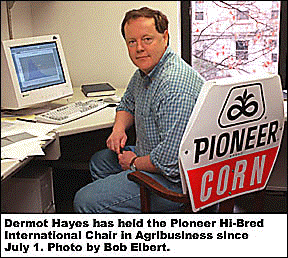Inside Iowa State
April 14, 2000
Finding niches for Iowa
by Kevin Brown
Iowa is in the right place at the
right time, says Dermot Hayes, Pioneer Hi-Bred International
Chair in Agribusiness for the College of Business.
 In the future, Hayes said, there will be two kinds of farms:
large 3,000- to 4,000-acre operations that produce the
cheapest foods, and smaller farms that add value and create
brand identity. The success of the small- to mid-sized family
farm will depend on farmers' abilities to hone in on market
segments and develop niche labels.
In the future, Hayes said, there will be two kinds of farms:
large 3,000- to 4,000-acre operations that produce the
cheapest foods, and smaller farms that add value and create
brand identity. The success of the small- to mid-sized family
farm will depend on farmers' abilities to hone in on market
segments and develop niche labels.
Born in Wexford, Ireland, Hayes looks to his homeland for examples of successful niche markets.
"Back in Ireland, farmers learned that restaurants were willing to pay a premium for eggs produced locally," he said. "Locally raised chickens aren't kept in cages so the eggs have a stronger, fresher flavor in the yoke due to the exposure to the environment.
"Some farms even put their family pictures on their eggs to reinforce their niche position," he added.
Local production and sales is going to become an important income niche for smaller farms in the United States too, Hayes said.
"There will continue to be zero economic profit for farming unless farmers start branding their products," he said.
"Coca-Cola markets brown sugar water and makes a good profit by limiting the availability of other people to produce it," he said. "This is the economic force farmers will need to be profitable. Iowa is well-positioned for developing value- added agricultural products."
Ireland to Iowa
Growing up on a farm that was in his family for
generations, Hayes comes by his passion for agriculture and
agribusiness naturally. However, he didn't see a future in
basic agriculture.
"I knew I wanted to be in agriculture, so I searched for an area that was related that had a future," he said. "Ireland exported a lot of commodities, as does the United States, so I pursued that."
It was that interest in international economics that brought Hayes to Iowa State in 1986.
"ISU had a position that intrigued me and offered a center to do research in meat exporting," he said. "And I fell in love with Iowa -- the people, the ethics, the scenery.
"When you grow up on a farm where you are basically farming on rocks, a big flat 40-acre field of rich earth is beautiful. This is a beautiful state."
Hayes said the Pioneer chair interested him because it gives him a new commodity to study -- seed corn. He is doing research now on genetically modified organisms (GMOs) and consumer acceptability of those foods.
"It's also exciting to work with both an old, well- established experienced college and a young, progressive and focused business college," said Hayes, who holds a dual appointment as professor of economics in the College of Agriculture and professor of finance in the College of Business.
"I see tremendous synergies here. I am teaching about the business of agriculture, but we also are working to create Web sites and discussing the relevancy new technologies have for agriculture," he said.
Agriculture online
Hayes said the Web "fundamentally is changing the
structure of agriculture."
For example, traditional meat processors found it impossible to create a "brand" loyalty for their products because the meat ultimately was sold by another business and it was too expensive and time-consuming to organize small farms into a single label with a consistent quality of product.
Hayes explains that if the beer or hotel industries worked as agrimarkets historically have worked, there would be only one kind of beer or hotel chain.
But the beer and hotel industries have succeeded at building brand loyalty and protecting the "branded" image, while continuing to strive to meet identified market niches. Because of technological advances, agriculture now may be able to share that same market force.
"The Web allows two or more individuals to meet cost- effectively and efficiently. That opportunity has been missing from the farmer to consumer," Hayes said.
The Web now will allow a single farmer, for example, to provide all of the beef for a specific East Coast restaurant -- and for both to build a reputation, he added.
Hayes is building his own reputation at Iowa State. Since taking over the Pioneer chair last July, he has created an MBA course on futures and options, reinsurance, vertical coordination and world grain and livestock markets. This effort complements his work as assistant director of the Meat Export Research Center and his research interest in food safety, projections of commodity import/export demand, demand vs. supply, commodity markets and agricultural trade policy.
Hayes looks to his origins to bring the numbers- and charts- oriented world of international agribusiness, futures and options to life for his students.
Humor is one of the most admired traits in Ireland, he said, and he draws on it liberally while teaching his classes.
"You have to keep the attention of 18- to 19-year olds," he said. "Economics can appear dull, so when you see them getting sleepy-eyed, you need to get them laughing. Laughter gives them a shot of adrenaline."
Iowa State homepage
Inside Iowa State, inside@iastate.edu,
University Relations Revised
04/13/00
Copyright © 1999, Iowa State University, all rights
reserved
URL:
http://www.inside.iastate.edu/2000/0414/hayes.html